#words in answer
Explore tagged Tumblr posts
Note
What are your thoughts on the relationship between Mineva and Haman and whether or not Haman cared for her beyond being a political puppet? SRW V put forth the idea that Haman may have had some genuine care for her and leaves Mineva with a lot of conflicting feelings on who was essentially family to her
Hmm.
So I was struck when I was rewatching Zeta episodes for the analysis of Haman that one of the first things she says about Mineva that isn't official-speak is calling the seven year old puppet-queen a coward.
I don't think there's any question that Zeta shows Mineva holding affection for Haman. It's very clear she is by far the most trusted figure in her life. But we are also told, almost immediately, that Haman has little sympathy for her over what is a fairly natural response to violence breaking out among the adults surrounding her. Later, Mineva says that Char understands her better than anyone else, which is interesting and ironic, but also points to her dependence on Haman having its limits.
Nevertheless, Mineva goes out of her way to defy Haman's instructions in order to return to the battlefield and share a warning when things spiral out of control. And Haman is surprised, evidently not for the first time, by the child's perceptiveness. So their relationship is not as simple as Mineva dancing to a tune set by her guardian. She has her own will and desires, and if those are a problem for Haman, there's no sense that she is overly restrictive of Mineva beyond what would be expected of the girl's position (etiquette, public relations, towing the party line - honestly, Char's reaction is at once valid and wildly naive).
Indeed, I think it's important to bear in mind that Haman's style of leadership is just generally quite publicly pleasant to those around her. I don't mean she never raises her voice or gets sharp, but rather that she has a very firm, very level, very confident persona that doesn't ever descend into you have failed me for the last time type excesses. She might brainwash and manipulate people on her side, but she doesn't get directly abusive to their faces (unless they prove themselves her enemy, at which point all bets are off). One of the reasons the break in Dakar works so well is because Judau scares her enough to drop the act and barrel furiously through her guards.
It's not really a surprise, in context, that Haman would be relatively kind to Mineva. That's the smart choice, especially since it is vitally important she control someone who, though young, outranks her. Mineva can simply decide to go off with a bunch of random kids, or move around on her own, or send Haman a bowl of (presumably expensive) fresh fruit as a gift, and there's not a lot anyone can do to contradict her. If there were, the entire underpinning of Neo Zeon society would collapse. You don't get to argue with the monarchy.
Under these conditions, it's also not a surprise Haman would swap the real Mineva out for a more pliable double when she needs to start making big moves (checking the Wiki, it asserts that Char took her away after the Gyps incident, but I don't think that's necessarily the implication from the end of ZZ - certainly it's never stated outright why Haman replaces her and the double must have been prepared ahead of time). We really have extremely little material where the real Mineva is interacting with Haman. Everything in Gundam ZZ has to be assumed to be the double, who we know doesn't believe Haman cares about her. We can additionally assume Haman preserving the double's safety is about maintaining the illusion, because if she doesn't, her authority is in jeopardy. She's already got Glemy true-Scotsmanning his way into a Zeon schism; she can't afford to lose her status as regent because it looks like she lost the queen.
So where does that leave Haman's feelings towards the real Mineva?
In my opinion, we're given too many reasons to read Haman's actions as cynical to attribute any of them to genuine affection. Haman is defined by her loneliness and there's nothing in their interactions to suggest Mineva does anything to ease that. I don't see how she could, given she is so thoroughly embedded in the structure Haman is subverting. Mineva is a figure, first and foremost, her actual personality and feelings secondary to her status as the thing to be controlled in order to achieve a certain result.
I think Hamann is presented as showing genuine care for Mineva, but the implied motivations are always self-serving and based on what would make life easiest. Quite often, the best means of getting what you want is to be nice about it.
And that would surely still leave Mineva with a lot of complicated feelings to work through. Heck, one of the things I would genuinely love to see as a UC spin-off (even though I think the franchise is massively over-saturated with tUC spin-offs) would be a follow-up focused on Mineva and her double getting to have a conversation about Haman. We never found out what happened to that other girl and it feels like a big missed opportunity.
Anyway, those are all the thoughts I currently have. Thanks for the ask!
36 notes
·
View notes
Text
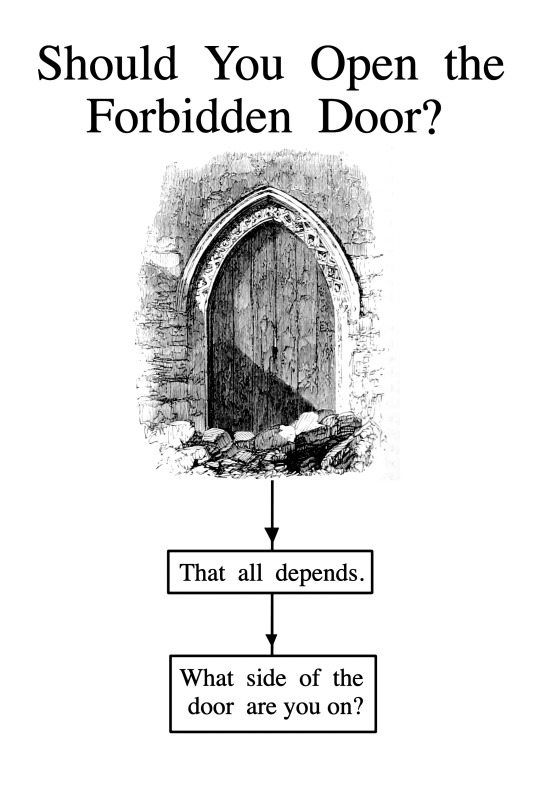
#Should You Open the Forbidden Door?#flowchart#questions#answers#unreality#if they didn’t want us to open it they shouldn’t put the word “door” in it
43K notes
·
View notes
Text
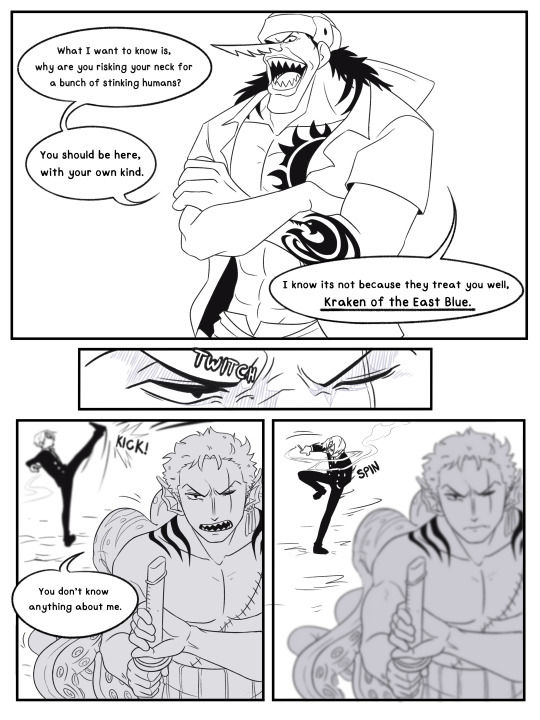
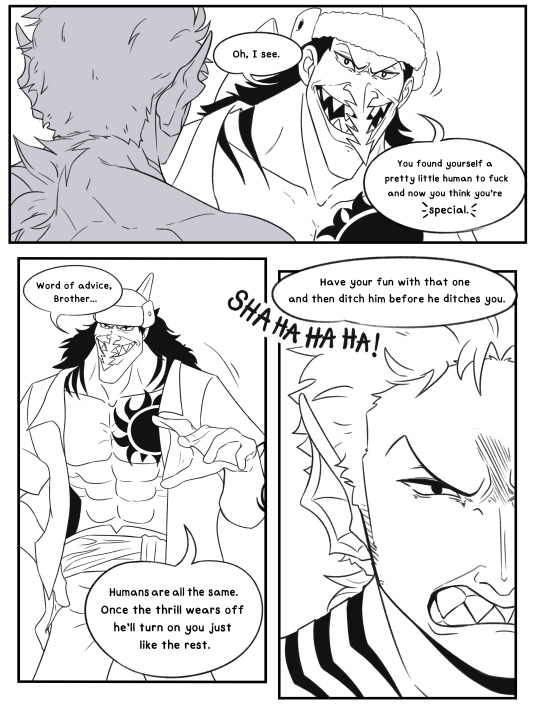
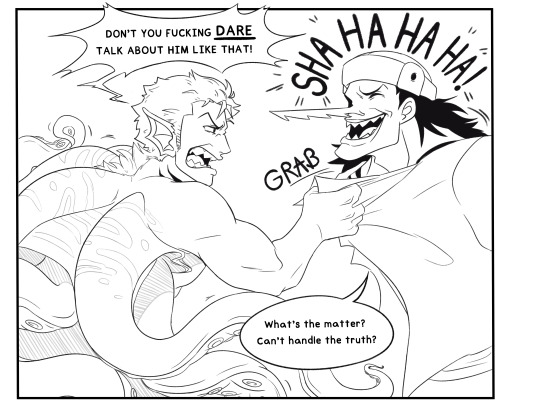
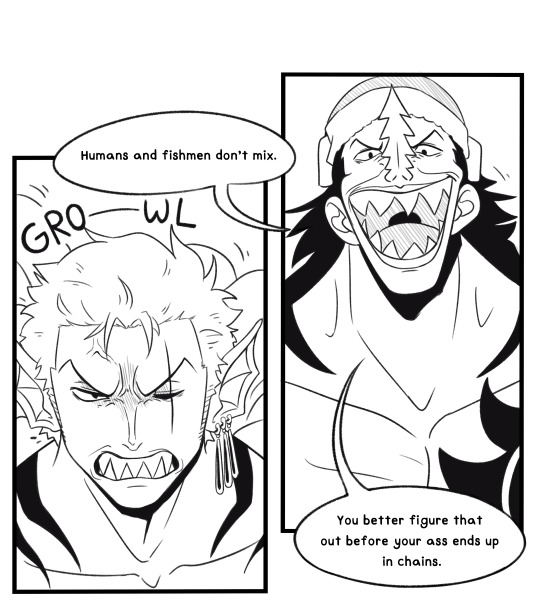
Another Riptide comic for @summerofspock and @vidrith because the last chapter had me thinking about how interesting fishman Zoro in Arlong Park would be
#it's possible arlong had heard about Zoro before in canon but i doubt he really cared#if Zoro was a fishman though he ABSOLUTLEY would have paid attention to every word hooo boy#he wants Zoro on his crew SO BAD#but unfortunately for him Zoro only answers to two men: his captain and his Curly#one piece#zosan#roronoa zoro#arlong#black leg sanji#fishman zoro
1K notes
·
View notes
Text
the fact that you can see the exact moment tears appear in his eyes

#dragon age#dragon age the veilguard#solas#solavellan#datv spoilers#veilguard spoilers#i'm not okay#look i'm not very good with words#but like#this is his last attempt to turn lavellan down but he sounds so tired and almost resigned here#like he knows the answer already#but still can't believe that she wants to leave the world behind just to be with him#but he also does want to be with her. so much. and now he's finally free to do so#so maybe that's not even an attempt but just a warning#there's hope in those eyes too#behind his warning is a question “are you sure that's what you want?”#and the answer is yes. because there's no fate but the love they share
3K notes
·
View notes
Text




We didn't even get an answer, and we never will (at least it's not determination)
FIRST - PREVIOUS - NEXT
MASTERPOST (for the full series / FAQ / reference sheets)
#deltarune#undertale#utdr#crossover comic#undertale fanart#deltarune fanart#art#twin runes#twin runes comic#kris dreemurr#frisk#chara#ralsei#aaaaah chara is slowly figuring out what they are#are you onto it too?#but I'm with susie let's get on with the story already!#for those who haven't picked up on it#this comic and the last one are poking fun at the whole “what does the red soul represent” debate in the fandom#especially under the last comic i've seen people viciously arguing with one another on other platforms#or people from both camps yelling at me#fact is we know that every human soul has determination due to the log entries in the true lab and the amalgamates#some humans just can have more and others less of it#that is what chara is pointing out about kris specifically#they have a red soul but less determination than most humans#the comic ends on a non-answer because unless we get toby's word on it we will never know what it is#and that is kinda a toby fox move#we will never get his answer#all we can do is theorize#personally I like to think it's love#especially in the context of this comic series
5K notes
·
View notes
Text
You shouldn't summon a Ghost King
Danny had felt the weird tug to the entirety of himself and instantly knew he was finally actually getting summoned for the first time.
He'd winced through the whole process, knowing he should have listened to Clockwork and changed the requirements now that he was Ghost King... but even though Clockwork had seemed pretty serious about it, it just... kept slipping Danny's mind. Listen, it's not that he didn't want to! executive dysfunction is a bitch alright, and it sounded like boring ghost paper work.
And it's been like... months now, maybe even a full year, maybe even longer. People don't really summon the Ghost King apparently, and Danny has been busy! He has school, he's trying really hard to get his grades back up. At some point he just completely forgot about it.
He's really regretting not taking it as seriously as he probably should have now that he's randomly on top of a skyscraper in some massive city he doesn't recognise. And the city is... for a lack of better words, on fire.
He can feel the suffering he can hear the screams, there is pain, chaos and fear all around him. Like a physical force pressing down on him.
The sickening part of it all is that he feels stronger than ever like someone injected him with 50 energy drinks directly into his veins but at the same time his stomach is recoiling violently, extreme jitters but not in a good way, absolutely nauseous.
He's not really listening to whatever is going on directly around him on that roof, that's all far in the distance somehow, maybe he's disociating, maybe something else other ghost thing is going on, but Danny is just floating there in full king regalia.
All he cares about it is snatching the weird creepy looking grimoire and getting some answers.
And answers he gets because its very clearly stated in there that the Ghost King (Pariah Dark) wants a tribute to himself. Whomever deigns to summon him must prove willingness to his cause. Aka the whole conquering and genocide and tyranny thing.
Over five hundred deaths would probably do but over a thousand was preferred, even more was obviously even better. That would show dedication and earn favour and- blah blah blah.
Danny thinks he's going to throw up.
It doesn't help that that's when the heroes show up and Danny is very clearly the big bad in this scenario even if it was completely unintentional.
Maybe they'll let him explain? Oh shit, that one looks so upset they're crying- maybe he can just go invisible instead...
This might be the worst night of his life.
#danny phantom#danny fenton#dpxdc#dcxdp#dp x dc#dc x dp#dp x dc crossover#dp x dc prompt#could probably also be x marvel now that I think about it#dp x marvel#ghost king danny#summoning gone horribly right#dp prompt#I got kinda stuck on the thought that to me summoning the Ghost King. the Ruler of the Infinite Realms. Is always depicted as insanely easy#-to do. Like the usually in these prompts the requirements for summoning at all is to just draw a circle and say some words and you'll get-#-some sort of answer. So I thought to myself. What if it's not that easy tho? And what if despite it being incredibly awful and hard-#-someone still goes ahead and does it because holy shit. Ghost King! And it's just a bad time for everyone#Heroes see Danny as the next big bad. the next world crisis invasion thing. A city is in shambles and everything. They are waiting on-#-The arrival of the army of monsters/robots/undead that they then have to fight to protect the planet#savwrites
2K notes
·
View notes
Text
Phantom letters - DPXDC PROMPT
The bats wake up one day to the internet going crazy; people around the world were getting letters from they're diseased loved ones. The reactions are mixed, from people being outraged for the "prank" to people crying in melancholy at getting closure.
All the letters have something in common: They're closed with a green sealing wax that had an stylize DP and the name Phantom beneath it. Posts about the cards were using the # Phantom Letters.
The bats are discussing the viral posts in the cave when Alfred comes holding a basket filled with letters, announcing they were left at the doors. The letters had the sealing wax that they recognize from the posts. Checking the cameras they can see how they glitch before the basket appears.
Alfred starts to distribute the letters that had only one destinatary. Letters from each Thomas and Martha to both Bruce and Alfred. Letters from each John and Mary to Dick. A letter from Catherine to Jason. A letter from the Drake's to Tim, and another one to Bruce.
Once they had calmed down enough from the shock, Alfred proceeded to read the shared recipients. From Thomas and Martha to "The grandchildren we never got to meet." From John and Mary to "the family that took our little Robin in." Letters from Catherine to "My little boys family." The letters were directed to people the deceased didn't get to meet.
As much as the mere existence of the letters tugged at their hearts, they decided to not read them until they verified that the handwriting actually belong to the ones it claimed. They checked each letter, and in the end confirmed the letters were in fact from they're lost love ones.
After much discussion, each person makes the decision to read they're own letters later in private, and they proceed to read the ones that shared recipients out loud. The letter mentioned specifics like names and events that the deceased shouldn't have been able to know, including they're vigilante abilities, which had them pause each time to panic a bit. But what was more interested were certain pieces of the letters that mentioned a Prince Phantom.
"Prince Phantom said to don't mention things past our death, but it wasn't a command, so we're hoping this won't be much of a problem." - John and Mary
"I still can't believe Prince Phantom is letting us do this, but I'm so glad." - Catherine
It finally paints the mystery in a more concerning light when at the end of Thomas and Martha's letter there is a call for help.
"We're sorry for ending the letter on a serious tone, but seeing the kind of job you all get involved in, we wanted to ask: Could you please help Prince Phantom? Phantom had asked us to not give information about this, but he's so young, and has already been hurt so much. Please, check on Amity Park, Illinois."
-_-_-_-_-_-_-_-
Meanwhile, team Phantom has decided that they needed to get the news about the GIW out of Amity and ask for help. Two problems:
the GIW blocks any technological attempt made.
People might be afraid to learn that ghosts exist and side with the GIW.
As a way to deal with the public image, Phantom opens a possibility that the death have never had:
"All afterlives are open to write letters to their love ones that are still alive today. Nothing that includes threats, and don't go talking about the anti-ecto acts or Amity Park yet, we're trying to ease people into our existence first. Also, I know you all check on your love ones when the veil is thin, but please keep the things you shouldn't know out of the letters if possible. If you want your letter to be sent in the first batch, make sure to deliver your letter before the week ends."
Letters are a good way to reconnect people with the death, they aren't digital, and the GIW won't be able to intercept letters if they're send through inter-dimensional portals. Two birds in one shot.
#dp x dc#dc x dp#dcxdp#batfam#Phantom Letters#Danny is the crown prince#The ghost king is actually the king of the infinite realms and the position can be taken by any denizen#not just ghosts#People had gotten used to call it Ghost King because Pariah's reign was so long and he was a ghost.#The infinite realm includes all the afterlives#Each afterlives is manage by its own responsible entity (usually ancients or gods) that answers to Phantom#Danny doesn't have free reign for everything#He has to take into account the God's and ancients words#but he makes the final decision#The God's/ancients didn't put any problem with the letters because they#Found the idea interesting and they're all hungry for anything interesting to happen#Eternity is boring okay?#dc x dp prompt#dc x dp crossover
3K notes
·
View notes
Text

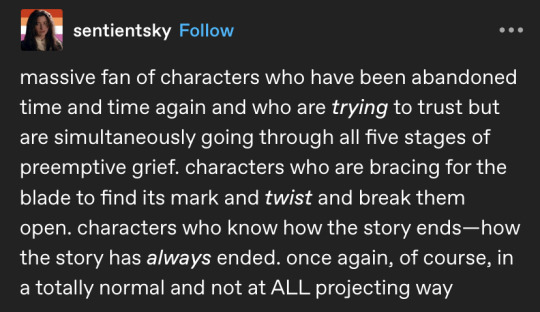

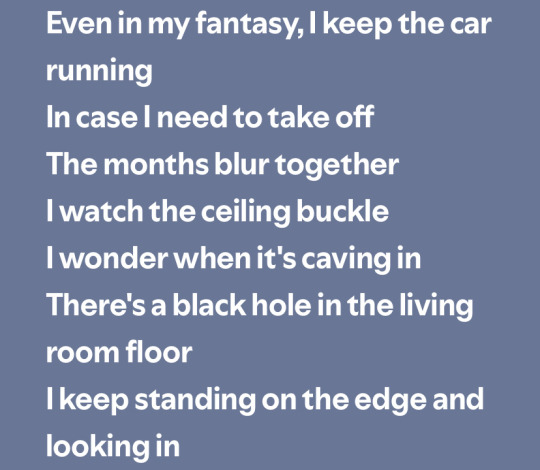
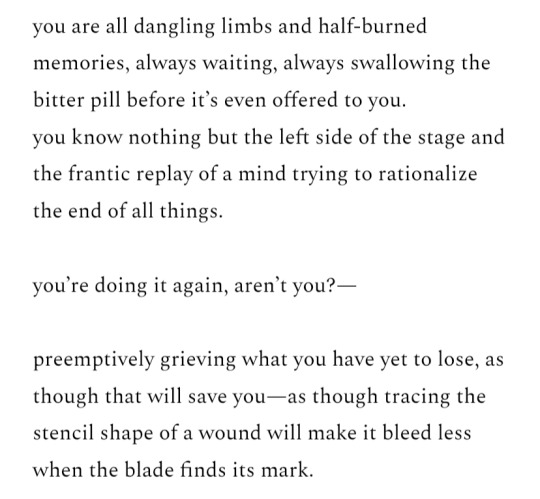
on preemptive grief. on bracing for impact. on looking towards the horizon line and flinching
Rayne Fisher-Quann, “home for the holidays: an essay (sort of) about grief (sort of)” // me // David Levithan // The Crane Wives, “Black Hole Fantasy” // me (again)
#‘hey wren do u happen to have abandonment issues?’ great question the answer is shut upppp >:(#(yes)#web weaving#word web#word weave#webbing#words words words#my poetry#my words#the crane wives#on preemptive grief#on grief#on leaving#on friendship#poetry#writers on tumblr#first one hit hard. i’m terrified of losing my best friend. in whatever capacity
2K notes
·
View notes
Note
Hey there! loved your IBO writeups and I wanted to hear your thoughts on a certain character relationship/dynamic that I have yet to see fully analyzed. What do you think is the significance or thematic meaning behind the Mika, Atra, and Kudelia trio.
Besides the occasional harem joke lol, the most I have yet to muse about their dynamic is that while both Mika and Kudelia are fixated on their self sacrificing roles and ideals, meaning Mika being the Devil of Tekkadan and Kudelia being the Maiden of Revolution, Atra seems to be the glue that binds them together and tie them back down to reality. Which fits considering the ending.
But what are your thoughts tho?
(Also any plans on a Mika and McGillis writeup)
Hi! Glad you've enjoyed the rambling!
First, really, truly sorry it took so long to get around to answering this. A combination of illness and heavy workload has left my brain more scattered than usual.
Second, nothing planned at present regarding Mika and McGillis, although it's definitely something worth exploring. There's a lot of interesting things to be said about the way McGillis misreads their relationship while being so inspired by Mika, and how Mika cuts through a lot of McGillis' bullshit by being tied to the reality the older man is trying to escape.
Now, on to the main topic.
One way to look at it is that Mikazuki, Atra and Kudelia are a marriage of different conceptions of what gives life meaning. You've got Mikazuki dedicating himself to serving another's ambition, Atra finding purpose in everyday tasks, and Kudelia working towards improving the world as a whole. These can also be seen as three different forms of sacrifice, with each of them giving up things they could have had elsewhere (self-direction, safety, status) for the sake of doing what they think is right.
Another approach is to emphasise their similarities, as equally compassionate people. Kudelia is spurred into action by moral indignation at the treatment of her fellow Martians. Mikazuki is automatically protective of those around him, including strangers. And Atra's skill-set is rooted in the practicalities of looking after other people. This shared drive shapes their relationship from the start: not for nothing do group hugs form key moments in its progression.
If I were to take a stab at assigning them a particular thematic meaning as a group, though, it is this: combined, they represent how far out of reach superficially mundane desires can lie for those at the sharp end of society.
Consider Atra. I've seen criticisms of Iron-Blooded Orphans focused on the stereotypical nature of her contentment with the domestic and desire to settle down with the people she loves (including somebody saying the writers 'had never met a woman in their life', which is bleakly funny) and yes, these do reflect gendered expectations to an extent. However, to stop there misses that, in context, 'I want a peaceful existence as a housewife and supportive member of the community' is a wildly aspirational life-goal. Before meeting Mikazuki, Atra was a homeless runaway fleeing a miserable existence as the dogsbody at a brothel. She isn't under any illusion that what she wants is going to follow naturally from simply being a girl, much less so after falling in with a group of suicidally-reckless child soldiers. The desperation that leads her to suggest Kudelia have a child with Mikazuki in order to keep him with them is extremely well-founded.
Likewise, as I've discussed many times before, Mikazuki's stated aim (devotion to Orga aside) is to be a farmer. To grow vegetables. More of a challenge on Mars than on Earth, yet hardly the stuff of a 50-episode mecha anime in its own right. But, again, Mikazuki is not in a social position where this is automatically feasible. Not only does he lack the required education, farming itself is not the stable livelihood it should be. Fighting is a far more certain source of income and while he does not ever stop trying to learn about growing plants – as a recent commenter rightly pointed out – the choices he makes or is forced to make continually place his dream further out of reach.
And for her part, Kudelia wants nothing more than to ensure Atra and Mikazuki can live the lives they want. Their articulation of her intentions reveals its core straightforwardness: she really is working to ensure the happiness of the Martian people. That's the entire point. Settling on Mikazuki's hypothetical farm is an idea she clearly sees as a long way off, even while cherishing the invitation. But she never wavers from wanting that reality for Mikazuki and Atra, and by extension the rest of Tekkadan. High-handed and naïve though her initial attempts to treat them as equals are, she keeps trying and internalises the lessons they teach her, and that only increases her commitment to a world where no child has to get blood on their hands for the sake of survival.
Here, though, we come to the crunch. Because the things in the way of the simple, simply-stated future these three are after do not lie within their actual relationship, which develops naturally over the course of events until they are firmly a romantic trio. Rather, they are grappling with being caught inside an exploitative structure that proceeds from three hundred years of Earth-centric hegemony. Mikazuki and Atra's poverty has roots far outside their control and Kudelia's challenges to those roots are met with violent resistance from the status quo. For them to be happy would require either a dramatic elevation of their position (Orga's solution), or transforming the economic distribution of their society (Kudelia's solution).
All three are ready to make a fight of it, utilising their complementary talents and shared reserve of bravery. They support one another as best they can through the ensuing struggles. Mutual respect and care is a key part of what binds them together, with Kudelia's determination reflecting what she sees in Mikazuki, Atra's acts of protectiveness towards Kudelia belying her noncombatant role, and Mikazuki swearing to fight for Atra's happiness as reciprocation for her declaration of love.
But in the end this is simply not a story where the daring warrior, plucky princess and brave peasant-girl can win the day. The sacrifices necessary to reach for a better future preclude everyone living to see it. Atra's fears that Mikazuki will be lost to them prove accurate. Kudelia's desire to provide those she loves with a safe, stable life is subordinate to the material connections necessary to pursue that very goal. And Mikazuki's drive to act for others leads him to embrace Gundam Barbatos, the silent fourth member of this relationship, carrying him inexorably to his doom.
I talked in my essay on queerness in IBO about how the epilogue is centred on Akatsuki. Mikazuki and Atra's son is the triumph achieved despite the tragedy, a testament to love that mattered in spite of the violence that consumed it. We find him living peacefully on Sakura Farm with Atra, Kudelia acting as his guardian, giving tangible meaning to his father's death and how things have changed since, no matter if Tekkadan are forgotten.
That framing, however, is bittersweet. The final shots, juxtaposing Akatsuki with photographs from before everything fell apart, reinforce the cost of reaching this point and there remain battles to be fought, as Kudelia smiles for the cameras, signing treaties with her enemies to further chip away at long-standing injustices. The better world is still a work-in-progress and far too many people didn't live to see even this much.
Behind the hope, the cruelty of the situation lies laid bare. Again, Mikazuki and Atra were not asking for much. Their happiness, which Atra achieves in part, would have been entirely unobjectionable. The suggestion Mikazuki enjoys killing makes him display – for him – considerable distress. His hands tremble at the idea, despite violence being central to his current existence. Indeed, it is that existence, stretching back to his time on the streets, that taught him to respond violently. Had things been different, he would have been content raising crops and children.
Even Kudelia's suggested changes are relatively mild. Greater economic parity with Earth is hardly an unreasonable request and finds supporters among the political class. At the same time, the outsized response exposes a great deal about how important the inequality is to those at the top, how it is actively chosen and enforced. Trite as it might seem on the surface, a goal of 'making everybody happy' can lead in radical directions, provoking questions like 'why isn't everybody happy?', 'who does their unhappiness benefit?', 'who would its abolition inconvenience?', and 'how does society justify the absence of happiness in the first place?'
Iron-Blooded Orphans spends its run pairing such matters with a sweet, supportive, polyamorous teenage romance. The sharpness of this contrast emphasises the humanity of those involved and the sheer unfairness of their circumstances – and of what is required of them to improve matters, when power is hoarded elsewhere.
-----
At least, that's where my mind went off the back of your question. There's a lot of that contrast in IBO, between the mundane reality of the people involved and their outsized reputation, infamy and actions. Plus, the treatment of sexuality, polyamory and queerness as just ordinary is something I deeply love about it, as a show.
Thank you for the ask! As a bonus note, this is my go-to Atra song.
('Words, you cannot possibly have a Thea Gilmore song for every occasion.' Just you watch me.)
[Index of other writing]
#gundam iron blooded orphans#gundam ibo#g tekketsu#tekketsu no orphans#mikazuki augus#atra mixta#kudelia aina bernstein#spoilers#relationships#social inequality#words in answer
30 notes
·
View notes
Text
reblog for larger polling please 🖤
#poll#polls#food poll#food#genres isn’t the right word but im using it lmfao!#and i wanted to exclude ethnicities n focus mostly on cooking styles !#answer cause i’m curious lol#recipes#comfort food#please reblog for larger sample size !
9K notes
·
View notes
Note
Does Silvers and Espios kids also have their abilities? PK and/or Invisibility?
They sure do! Let's start with Psi;

Psi inherits psychic powers from Silver, but they don't work the same. His powers are exclusively telepathic as opposed to Silver's telekinesis. He can project thoughts and illusions to any target of choice, as well as read minds. He and Alloy use the mind read/transfer thought trick ALL the time to chat and goof off without anyone knowing :'D It's the only time he's ever a real chatterbox
He's very unstable, though. When not held in check, he can't focus his powers at all or control how much of it he uses. If he doesn't wear the braces, he can just hear everyone's thoughts simultaneously, and he gets super overwhelmed very very quickly. The more stressed he is, the more power he unleashes, and the more power he unleashes, the louder everything gets. When he's in top overload like that, he emanates an aura of psychic noise around himself that interferes with the senses of anyone who gets close to him.
I think that about covers it for him, so lets move on to Alloy;

Where Psi inherited Silver's powers, Alloy inherited all of Espio's chameleon abilities! She can climb on walls and ceilings, she can use her tail to grapple and cling to things, and she has a chameleon tongue that she can use to steal shit out of her brother's hands <3
The only thing that doesn't directly transfer is the invisibility. She can colour shift, but she can't control when she does it. Usually, it only happens if she's either frightened and feels the instinctual need to hide, or if she's very angry where it works as a form of threat display.
I think that's all there is?? I hope this made sense! :'D
#sth#sth fanart#silver the hedgehog#espio the chameleon#espilver#sonic fankid#sonic au#pitayaverse#psi the chameleog#alloy the hedgeleon#roonies doodles#roonie answers#tldr psi gets telepathy and alloy gets all the freak chameleon abilities#tw blood#ALSO i thought it'd be really really cute if espio taught his kids to call him dad in japanese#i went with otousan because from what i could gather that's like saying father? and imo espio WOULD teach them the formal word#but i dont speak japanese so while i tried my best to find the right word i may have messed it up :') feel free to correct me if im wrong!!
966 notes
·
View notes
Note
more black sapphire. PLEASE. /j
on a serious note, since he knows all the gossip and stuff, imagine self-aware BSC having access to y/n(?) private's account on twt where they post literally ANYTHING to their close friends, including controversial ( but stupid ) takes ( like white chocolate is better than dark/milk choco ) and when they open the game Black Sapphire is like "so white chocolate huh" and then they just freak out.
I love self-aware cookies, and find the thought of them being able to not only mess with the game but the whole device ( thanks golden cheese ) very hilarious because imagine you're in the middle of class and shadow milk opens youtube and plays circus clown music
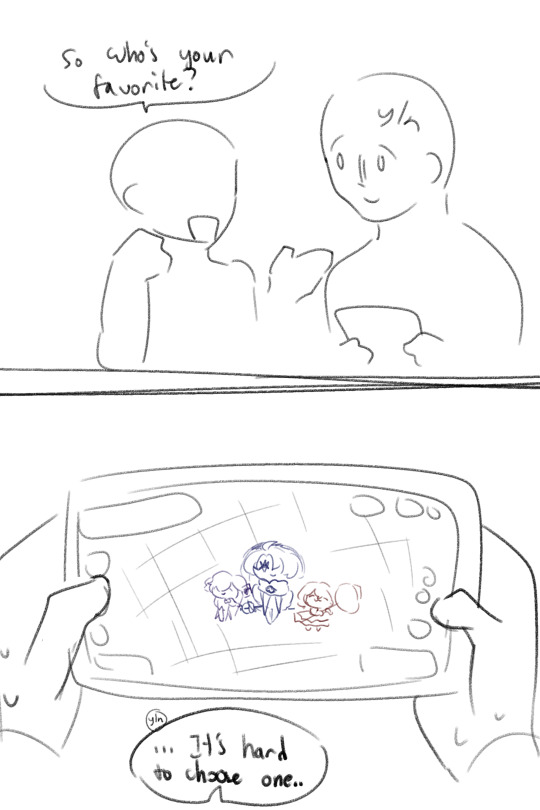
#HELP????#so true tho#alli answers#crk x reader#crk x you#shadow milk cookie x reader#shadow milk x reader#black sapphire cookie x reader#candy apple cookie x reader#their weapons are out...surely they wont do anything right? just choose the right and only words
737 notes
·
View notes
Text

Out of sight, out of - wait.
[First] Prev <–-> Next
#poorly drawn mdzs#mdzs#wei wuxian#granny wen#a-yuan#It's always fascinating how colours translate from the page to the screen.#It would probably surprise a lot of people to see what some of these comics actually look like in physical form.#My lighter colours takes about 3-4 washes before it shows up on scan which means it tends to ripple the page.#And my yellows and oranges are drastically different colours when scanned compared to the ink colour.#There's about 20 or so comics where everyone's hair is purple - because it scanned in the exact same colour as my light grey.#Wait my book is right here in front of me so I can...yeah...Comics 57-77 were indeed purple.#This is all to say - is it not fascinating how what we see is often not the full truth of what the subject truly is?#Is it not fascinating to open another episode that reminds us that despite everyone's claims they could totally spot the evil YLLZ-#-The man walks around among them for months as no more than a man haggling for deals like the rest.#It's almost as if he's just a person. It's almost as if none of us - no matter what we do are really anything more than just a person.#Your good acts will be overtaken by how other's interpret you in negative light.#Just as easily are people willing to forgive crueler actions if they hold you in high esteem.#But what's real? Is the page I hold the real version of this comic? Is it the one you look at?#Is the man known as Wuxian the most himself when he is alone or on the battlefield?#Perhaps he is and has always been a scared orphan boy lost in the market.#I think there is no good answer to any of these questions.#But I do know that panic rising in WWX as he frantically looks for A-yuan was for more than one boy.#To be human is to have layers around a delicate center. We only really grow around our wounds from childhood.#In other words; Donkey from Shrek would also probably call Wei Wuxian an onion. I'll see myself out now.
1K notes
·
View notes
Text

'We go together!' 🤝
#team fortress 2#tf2#tf2 fanart#tf2 medic#tf2 heavy#trying out a slightly diff line approach and rare time where i draw them with their canon-ish heights#the working title for this was medic saying that this is the start of a beautiful situationship lol#i've only just learnt the word and now like a true millenial im (mis)using it everywhere#ONE DAY ill look at reference and learn how to draw arms and hands#i have covid (AGAIN!!!!) this is like my 9th time now RIP so sorry for being quiet i'll answer my messages VEERY SOON
2K notes
·
View notes
Note
Parte favorita de god games 3 2 1 vai
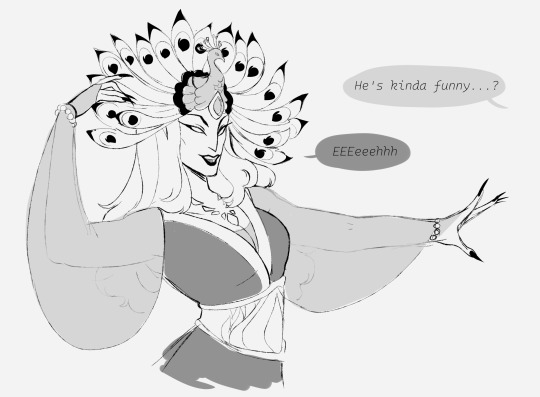

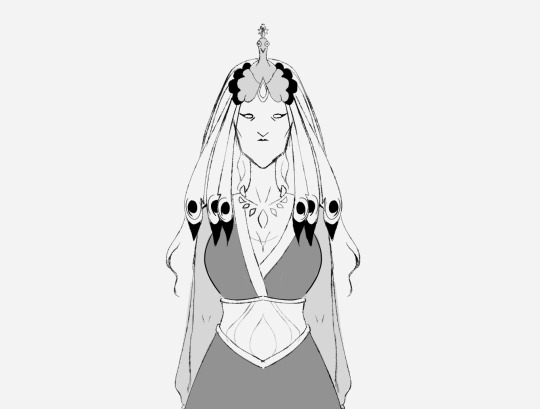
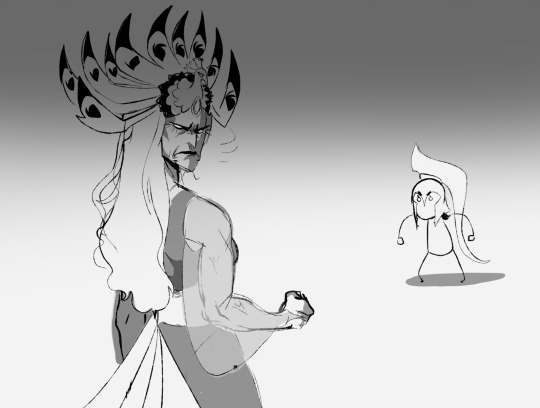
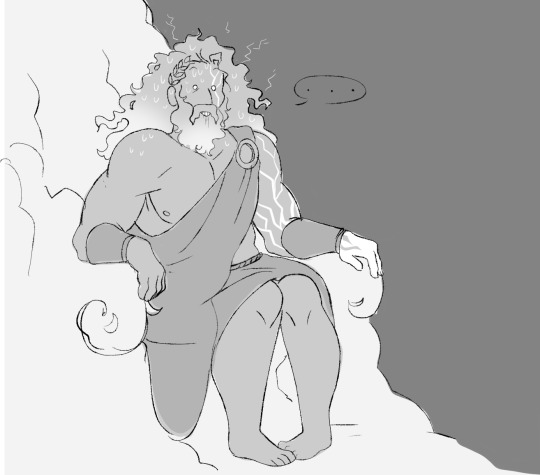
Release him.
Like damn Athena u were supposed to convince them not obliterate them like that-
#asks#my art#digitalart#sketch#epic the musical#god games#epic hera#epic athena#epic zeus#I'm slow REALLY SLOW due to thesis and commissions#but I'm working my way through asks#I know I can just answer with WORDS but I like drawing things from time to time ok akjshdgjkas#also I'm never drawing you again Hera that design I gave you was a mistake oh god
670 notes
·
View notes
Text

Swallowed by a leviathan
#Virtue Temperance#tgd Temperance#the gaslight district#gaslight district#tgd#art tag#look I over paint 👈 me know how to art#anyway I really hope he comes back. I want Mel to have complicated feelings about her “actual dad”#He would have all the answers for her and Ken made sure Temperance can't answer any of them#Also I am not very slick with my choice of words but let me be delulu and think I'm cooking
1K notes
·
View notes